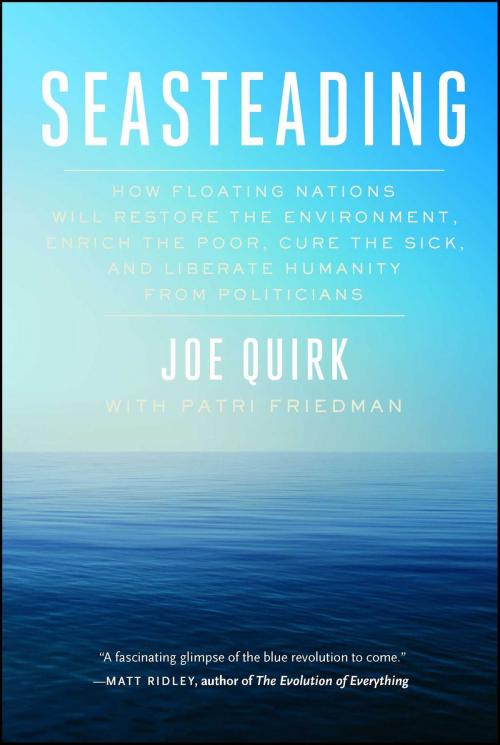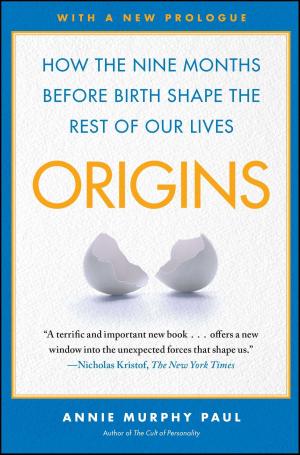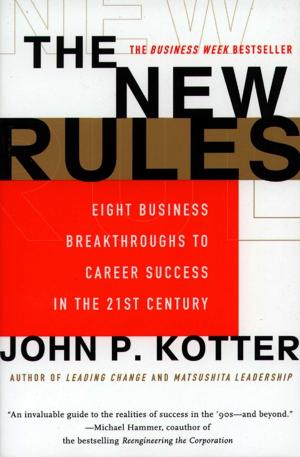Seasteading
How Floating Nations Will Restore the Environment, Enrich the Poor, Cure the Sick, and Liberate Humanity from Politicians
Business & Finance, Career Planning & Job Hunting, Entrepreneurship, Entrepreneurship & Small Business, Management & Leadership, Leadership| Author: | Joe Quirk | ISBN: | 9781451699289 |
| Publisher: | Free Press | Publication: | March 21, 2017 |
| Imprint: | Free Press | Language: | English |
| Author: | Joe Quirk |
| ISBN: | 9781451699289 |
| Publisher: | Free Press |
| Publication: | March 21, 2017 |
| Imprint: | Free Press |
| Language: | English |
In these “thought-provoking visions of the future” (The Wall Street Journal), Joe Quirk and Patri Friedman of the Seasteading Institute explain how ocean cities can solve many of our environmental, technological, and civic problems, and introduce the visionaries and pioneers who are now making seasteading a reality.
Our planet has been suffering from serious environmental problems and their social and political consequences. But imagine a vast new source of sustainable and renewable energy that would also bring more equitable economies. A previously untapped source of farming that could produce significant new sources of nutrition. Future societies where people could choose the communities they want to live in, free from the restrictions of conventional citizenship. This extraordinary vision of our near future as imagined in Seasteading attracted the powerful support of Silicon Valley’s Peter Thiel—and it may be drawing close to reality. Facing growing environmental threats, French Polynesia has already signed on to build some of the world’s first seasteads.
Joe Quirk and Patri Friedman show us how cities built on floating platforms in the ocean will work, and they profile some of the visionaries who are implementing basic concepts of seasteading today. An entrepreneur’s dream, these floating cities will become laboratories for innovation and creativity. Seasteading “offers hope for a future when life on land has grown grim” (Kirkus Reviews), proving the adage that yesterday’s science fiction is tomorrow’s science fact.
In these “thought-provoking visions of the future” (The Wall Street Journal), Joe Quirk and Patri Friedman of the Seasteading Institute explain how ocean cities can solve many of our environmental, technological, and civic problems, and introduce the visionaries and pioneers who are now making seasteading a reality.
Our planet has been suffering from serious environmental problems and their social and political consequences. But imagine a vast new source of sustainable and renewable energy that would also bring more equitable economies. A previously untapped source of farming that could produce significant new sources of nutrition. Future societies where people could choose the communities they want to live in, free from the restrictions of conventional citizenship. This extraordinary vision of our near future as imagined in Seasteading attracted the powerful support of Silicon Valley’s Peter Thiel—and it may be drawing close to reality. Facing growing environmental threats, French Polynesia has already signed on to build some of the world’s first seasteads.
Joe Quirk and Patri Friedman show us how cities built on floating platforms in the ocean will work, and they profile some of the visionaries who are implementing basic concepts of seasteading today. An entrepreneur’s dream, these floating cities will become laboratories for innovation and creativity. Seasteading “offers hope for a future when life on land has grown grim” (Kirkus Reviews), proving the adage that yesterday’s science fiction is tomorrow’s science fact.















